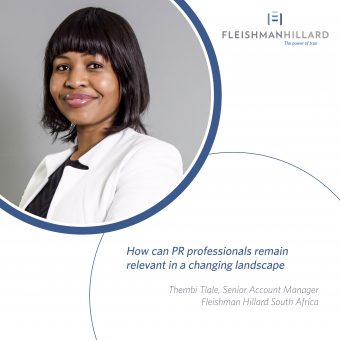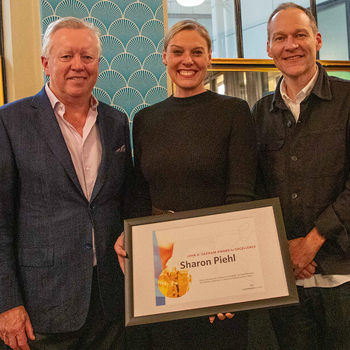How can PR professionals remain relevant in a changing landscape?
 As many of you know, the communications landscape is changing rapidly. So rapidly in fact, that qualified professionals sometimes find it hard to stay sharp and keep their skills and information references up-to-date with the latest trends. In a blog from earlier this year our Managing Director Sharon Piehl wrote:
As many of you know, the communications landscape is changing rapidly. So rapidly in fact, that qualified professionals sometimes find it hard to stay sharp and keep their skills and information references up-to-date with the latest trends. In a blog from earlier this year our Managing Director Sharon Piehl wrote:
“PR is dead – but what is exciting is how the communications sector is evolving and how the industry is embracing that change by bringing together art and science to better equip the ‘consultant of the future’ with necessary skills across disciplines”[1].
What has become increasingly acknowledged over the past few years is that young people who enter the workplace are little prepared for the realities of work. In essence, they have the theoretical knowledge but not the practical skills to match – illustrating a divergence between formal education and job-skill-specific education[2].
This got me thinking about the skills and expertise the ‘consultant of the future’ needed in order to survive the changing landscape and remain relevant. The answer is just that –they need to remain relevant.
Relevant in terms of their thinking, their understanding of the media landscape in the region, their approach and more importantly how they consult to clients. For many aspiring professionals studying towards a communication qualification, this relevance starts in the lecture room. While there are several lecturers and professionals who dedicate their lives to adequately equip young people, they too find themselves in the trap of sharing outdated information as they simply cannot keep up with the latest trends.
A case in point for me was during my post graduate studies, during a crisis management lecture where we were interrogating different crisis issues and how they had been mitigated. Our lecturer led with the old age BP oil spill crisis issue. While this example may have been relevant from a global perspective and was a perfect example of what not to do or say as a business in crisis, I found myself wondering if the lecturer had read the news lately, as there are many examples of crises or issues in our local news that we can bring to the fore that will make the theory of crisis communication come to life and not be viewed as a foreign concept for students.
So how can our academic institutions assist to not only provide the future workforce with the relevant skills, but more tangible and real skills they can share that will help them to navigate the work environment, especially one that is always evolving like ours.
I have identified three key traits that I believe can be developed and included in the curriculum:
Flexibility
There is no doubt that public relations is a career that demands flexibility. Therefore to be a good PR professional, you need to have the ability to handle whatever comes your way, in the most efficient way possible. People who are flexible can be approached easily as they are willing and able to accept any changes presented to them. They do not show rigidity in accepting other views or opinions. Flexible consultants are key to the industry as they are effective in finding solutions to problems as they arise.
Keep learning
One of the most valuable lessons you will learn as a consultant is to ask questions in order to keep learning. Becoming a well-rounded PR person is not a walk in the park. The path to achieving success while developing your own brand as a consultant largely depends on your ability and willingness to learn. Don’t ever get set in your ways or think you have all the answers – there are always new and better ways of doing things to better show your value. Learning can apply to many things too, not just your professional career.
Building relationships
Developing and building relationships is at the core of what we do. We develop relationships with our clients both existing and potential as well as with media who are key in story telling for our clients. These relationships are no different to the relationships we have with our family and friends – they are hinged on trust, loyalty and respect.
These three areas are the cornerstone to what we do at FleishmanHillard. We pride ourselves in our commitment to developing skills and ensuring that we prepare the young professionals coming through our doors for their career. While they may have covered all the relevant theory in terms of PR, some elements like the art of email writing, engaging with journalists, participating in brainstorms and planning for meetings are not things that can be taught in a lecture hall. This year I have enjoyed spending time with our interns and mentoring them as part of their journey to becoming great consultants who are prepared for the constantly changing environment we are in.
As we all continue to grow and excel in our profession, we must remember the wise words from Steve Jobs “Stay Hungry. Stay Foolish.”
Thembi Tlale, Senior Account Manager, FleishmanHillard South Africa
[1] https://fleishmanhillard.co.za/2017/06/harnessing-skills-future/
[2] https://fleishmanhillard.co.za/2017/06/harnessing-skills-future/
Find Out More
-
Digital Insights Bulletin - October 2024
October 31, 2024
-
Sharon Piehl Wins 32nd Annual John D. Graham Award for Excellence
October 25, 2024
-
Digital Insights Bulletin - September 2024
September 30, 2024


